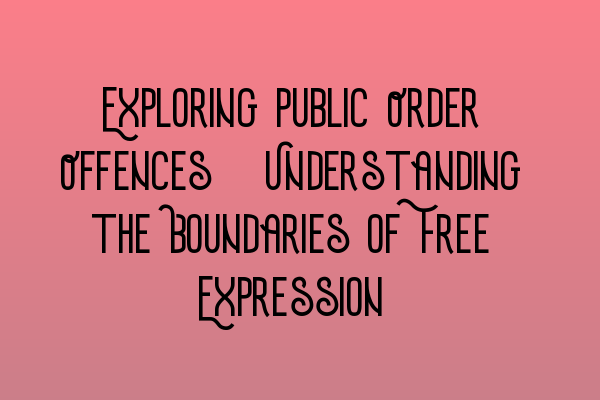Exploring Public Order Offences: Understanding the Boundaries of Free Expression
When it comes to public order offences, understanding the boundaries of free expression is of utmost importance. In today’s society, where tensions run high and opinions differ greatly, it’s essential to have a firm grasp on what is considered acceptable and legal.
One of the key aspects of free expression is the right to express one’s views, beliefs, and opinions freely. However, it’s crucial to remember that this right does not give individuals the license to incite violence, discriminate against others, or cause public disturbances. The line between exercising your right to free expression and crossing into criminal territory can be blurry, which is why having a good understanding of public order offences is vital.
The Different Public Order Offences
When it comes to public order offences, there are various acts that can be deemed illegal. These include:
- Public Nuisance
- Violent Disorder
- Incitement to Hatred
- Harassment, Alarm, or Distress
Public nuisance refers to any act or omission that causes harm, annoyance, or inconvenience to the public. This can include disruptive behavior in a public place or excessive noise that disturbs the peace. It’s important to note that what may seem like harmless fun or a minor inconvenience to you might be seen as a public nuisance under the law.
Violent disorder, on the other hand, involves a group of three or more people using or threatening violence that would cause a person of reasonable firmness to fear for their safety. This offence often occurs during public protests or demonstrations, and it’s crucial to differentiate between peaceful assembly and violent conduct.
Incitement to hatred is a particularly serious offence that involves encouraging or promoting violence or hatred against individuals or groups based on their race, religion, nationality, or other protected characteristics. Discrimination and hate crimes have severe consequences, both legally and socially.
Harassment, alarm, or distress refers to any behavior that causes another person to feel harassed, alarmed, or distressed. This can include offensive remarks, threats, or repeated unwanted contact. It’s important to be mindful of how your words and actions might affect others and to always aim to promote harmony rather than discord.
Understanding the Boundaries
While freedom of expression is a fundamental right, it is not absolute. The law recognizes that there are limits to what is deemed acceptable in a democratic society. When exercising your right to free expression, you must also consider the rights and freedoms of others.
For example, shouting offensive and discriminatory slurs in a public place is not protected speech. It may promote social unrest and cause distress to others. It’s important to be respectful and considerate of the diverse community we live in.
Additionally, it’s essential to ensure that your actions and words do not incite violence or harm to others. Inciting violence in any form goes against the principles of a peaceful society.
Understanding the boundaries of free expression is crucial for maintaining a harmonious society and upholding the rule of law. By being aware of the different public order offences and their implications, you can navigate public spaces confidently while respecting the rights and dignity of others.
